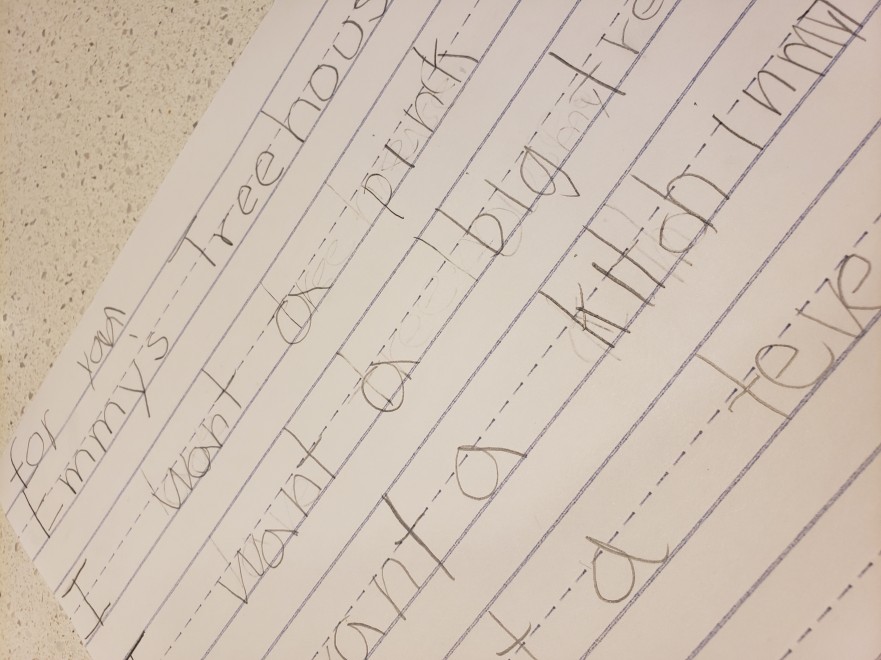People always roll their eyes when I tell them I love teaching middle school. “I could never do that. All the hormones. No thank you.” I always laughed it off and responded, “Oh man, could never teach the little ones. All the snot and tears? Not for me.”
Then, this weekend, I watched my kindergarten niece, Emmy, write four sentences all about a treehouse she wanted her father to build. I finally understood the allure of teaching early elementary. Watching her form letters, words, and ideas, I was filled with pride, but also amazed at her process. As a secondary teacher, this early stage literacy was breathtaking to watch firsthand.
She was deliberate.
Every line, curve, and space was carefully thought out. She struggled with the ‘k’ sound and asked for help. Emmy stuck her tongue out of the side of her mouth when she was concentrating really hard and cocked her head to the left, then to the right when she needed some extra time to think.
In an age where so much is dictated to teachers, it’s hard to be as deliberate as Emmy was at that moment. She had complete and utter control over every single shape of a letter she made; the adult teachers in her life are not as lucky. Teachers do not get the freedom that Emmy has, but we do get the opportunity to be as deliberate as she is. To be as intentional as a six-year-old writing about a treehouse is one of my new goals.
She revised.
She reread her work and realized she had left out a word or two. Emmy smushed it right in there because her primary concern was getting her ideas down. She erased, changed words and ideas, and made approximations. It didn’t have to be pretty, it just had to be there. Ideas matter.
I constantly see teachers get mired down in making things pretty; being lured by the ease of TeachersPayTeachers or hyper-focused on classroom decor and theming. But I don’t remember the decor of any of my teachers’ rooms. I remember the debates of my 7th grade English class, the molarity song, and primary source documents of the Great Depression. Students remember ideas.
She took a risk.
Reading and writing are new skills. Yet, there Emmy sat at the kitchen table, pencil clasped and she worked. She worked hard. She got frustrated and she worked through it. Her comfort zone at that moment was definitely not at the kitchen table; it was turning cartwheels in the backyard. But there she sat all the same.
After 12 years in education, I know exactly what my professional comfort level is. In the classroom, I had my ‘go-to’ teaching moves that I knew would work most times. In my mentoring role, I have my ‘go-to’ questions and mannerisms. Moving outside this comfort zone, especially as an adult, can sometimes be so very scary. Watching Emmy’s frustration and eventual pride challenged me to do those outside-my-comfort-things more often.
The deliberation, risk-taking, and adaptability of a six-year-old shook this secondary teacher. Her story is hanging on my wall, a reminder that hard work is rarely easy and always rewarding.










Comments 1
Thank you for this piece. I teach grades 1,2,3 and this is a great reminder and demonstration of the wonderfulness of their contributions. I agree with you that students remember ideas and experiences more than they do most things we are overfocused on. Thank you, again, for this reminder.